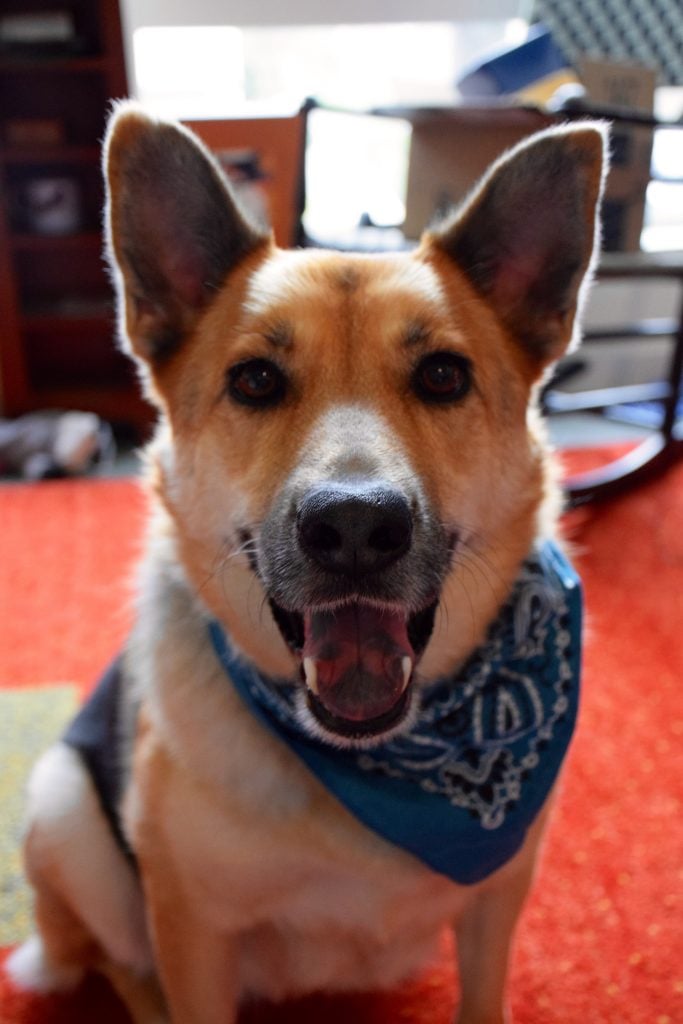This is Lana. When I adopted her she was starving, scared, and had recently given birth. But despite her hard life, she still had so much love to give. In our first month together, I learned that she loved to snuggle on the couch, play with her toys and, unfortunately, that she was incredibly dog reactive. So I gave up my dreams of bringing her into my wonderful dog-friendly office and instead focused on just getting her through daily walks without an eruption.
I’m sure this has happened to you at the dog park, the vet’s office, or even on a stroll around your neighbourhood. You’re approaching another dog and their owner when suddenly, their dog catches sight of yours. The strange dog erupts into barking, snarling, and lunging. It’s downright scary!
I’m one of those people trying to distract and desensitize my reactive dog.
I’m one of those people trying to distract and desensitize my reactive dog, and this is what I (and other reactive dog owners) want you to know.
We’re Sorry!
I wanted to start this post off with an apology. I know you’re:
- Trying to enjoy your walk, and we’re disrupting it.
- Worried about my dog attacking your dog.
- Wondering why she’s so volatile, and what I’m doing about it.
I’m sorry that she’s scary, and I understand your fear. It’s something I felt myself before I learned about reactivity, what causes it, and what we as pet owners can do.
Reactivity is Fear-Based
It’s surprising, but reactive dogs appear aggressive because they aren’t confident. They’re actually scared of whatever is triggering them. Reactivity can have several causes, from genetics to poor socialization, to memory of a traumatic event. And it manifests itself in:
- Lots of barking, lunging, snarling and whining.
- Alert, stiff body language.
- Hard staring.
The dog has learned that being as big and loud as they possibly can be causes the trigger to retreat. This happens either when other dog and owner run away, or the reactive dog and owner evade the situation.
We Want to Give You Space
When I take Lana for walks, I go during the quieter times of the day to keep her calm and to not ruin the walks of other pet owners. When I see other dogs I:
- Turn in the other direction to create distance.
- Give Lana treats to make the sight of another dog a good experience.
- Employ a U-Turn if we happen to be surprised by another dog.
- Use commands like “Find It” or “Look at Me” to engage Lana.
I hate when I disturb another dog owner on a walk with their non-reactive dog, and I also don’t enjoy when Lana goes over the threshold. So if you see someone with a dog who turns when they catch sight of you, they’re probably trying to avoid a reactive incident!
We’re Working on It!
Reactive dogs deserve our love, patience, and compassion.
Owning a reactive dog can be embarrassing and hard, but it’s worth it to give a lovable leash gremlin a chance. Reactive dogs deserve our love, patience, and compassion to get them through their phobias. Lana and I (and other reactive dogs and their owners) are working toward calm walks every day. For us:
- Every day is a training session. Each walk is an opportunity to reinforce that other dogs (and people, bikes, cats and birds) are a positive experience that won’t hurt them.
- It’s slow going, but it’s worth it. Lana has calmed incredibly in the time I’ve been working with her and I know she will keep getting better with time.
- Our vets, trainers and behaviourists are our constant support. We’ve worked with several people in finding a solution and will continue to lean on them for guidance.

Lana the week I adopted her in 2015 vs. a year later in 2016.
Working with a reactive dog is challenging and often lonely. It’s also a very common problem. Many dogs are not properly socialized and some rescue dogs come from bad situations and have no interest in being around other dogs. I am seeing small changes in Lana—she’s stopped barking out the window at our neighbour dogs—and hope that as she continues to gain confidence, her reactivity will diminish.
If you’re looking for someone to look after your reactive dog while you’re away, Rover.com has lots of experienced dog walkers and sitters who offer dog boarding so you’re sure to find your dog’s perfect match.



